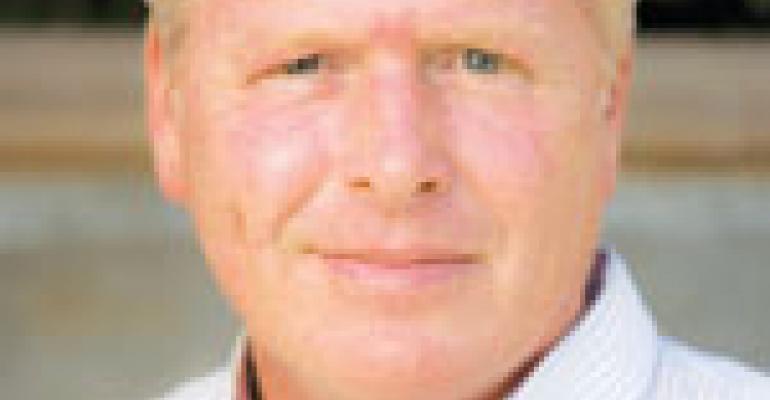It isn’t easy to stand out in the increasingly crowded world of better burgers, but J. Dean Loring thinks he has found a niche with his 2-year-old Burger Lounge concept.
With four units in Southern California and a fifth planned for next year, the upscale fast-casual concept offers burgers made from 100-percent grass-fed beef, which Loring said is more healthful, hormone- and antibiotic-free, better for the environment, and sustainably produced by independent ranchers.
The menu is small, but the offerings are high-end, with freshly baked buns made of organic whole-wheat and white flours, Belgian-style hand-cut and twice-fried fries flecked with parsley, and onion rings in a buttermilk batter crisp with Japanese bread-crumbs. Salads are made with organic greens and house-made dressings. Beer and wine are on the menu, as are hand-dipped milk shakes topped with real whipped cream, and decadent red velvet cupcakes. The average per-person check is around $12.
Guests order at the counter, but there are fine-dining touches throughout the experience. Servers grind pepper over salads at the table, for example, and get refills on drinks.
Can you explain this “better burger” mania?
It’s a natural reaction to the economic downturn and people moving away from $100 meals. People want comfort foods, but they’re also demanding greater value and higher quality than ever before.
Burger Lounge isn’t your only concept?
I opened the casual-dining restaurant Cody’s in La Jolla, Calif., 11 years ago. Mike Gilligan, who was formerly in banking and looking for an investment, bought into Cody’s, and together we launched Burger Lounge. Twenty years ago, I also founded Stars Hamburgers in Northern California, which was a similar concept.
FAST FACTS BIRTH DATE: Sept. 19, 1957HOMETOWN: Sonoma County, Calif.EDUCATION: bachelor’s degree in English literature from Humboldt State UniversityPERSONAL: single
You talk about elevating a fast-casual brand to the level of fine dining. How does that work?
It’s about best practices in food production. We use a commissary system, for example, and everything’s prepared from scratch. But it’s also about the service component. At most fast-casual places, that relationship ends at the point of sale. We try to build an ongoing relationship with guests.
Not only are you competing against cult favorites like In-N-Out Burger in Southern California, you’ve also got brands like Five Guys from the East Coast coming in, and Smashburger out of Denver. Does that worry you?
We fancy ourselves as more of an urban brand. We’re not going to be on freeway off ramps, like those other guys. We have a smaller footprint—1,200 to 2,000 square feet—and we go into upscale urban neighborhoods.
How is the recession treating you?
We have two stores that have been open more than two years, and same-store sales are up 27 percent to date, the past 12 months over the same period last year.
Why can’t I get bacon on my burger?
We have no swine in-house—not that I have anything against pork. Bacon grease is hard on kitchens, and it is hard to make money on bacon that is commensurate in quality with our other ingredients. You’d have to charge $3, and the public is not ready for a $3 bacon add-on.




